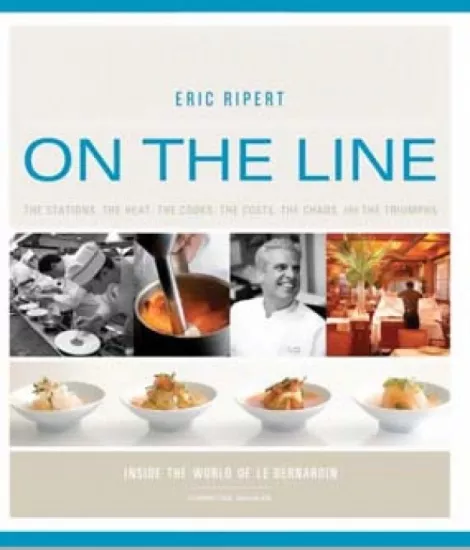
n\I recently reviewed 10 Arts restaurant in Philadelphia, the new fine-dining outpost for Eric Ripert, of New York City’s Le Bernardin fame. By coincidence, I also received Ripert’s new book for Christmas, after Log Haven chef Dave Jones recommended it to my wife. On the Line: The Stations, the Heat, the Cooks, the Costs, the Chaos and the Triumphs might be a clumsy book title, but this is one helluva terrific book. Aside from Tony Bourdain’s Kitchen Confidential, it’s one of the few books I’ve seen aimed at nonprofessionals that takes the reader smack dab into the middle of a professional kitchen—in this case, Le Bernardin’s. n
Unlike Kitchen Confidential, Ripert’s book isn’t gossipy or cute. But it tells you everything you’d ever want or need to know about how a top-notch kitchen operates, from explaining the stations in a professional kitchen (executive chef, sous-chef, tournant, garde-manger, etc.) and some of the slang you hear in a busy kitchen (“Quai!” “Behind!” “Fire!”), to what’s in the Le Bernardin pantry and walk-ins and actual menus of staff meals (on Mondays the crew gets lobster pasta for lunch).
nChapters like “The Birth of a New Dish” and “A Night on the Line” are as riveting as anything by John Grisham, and the section called “Food Costs Explained” is enlightening to both the future restaurateur and the curious customer. A large section called “The Dining Experience” describes in detail the “rigorous ballet” performed every night by the Maître d’, sommeliers, front waiters, captain, back waiters, busboys, bartenders, hostesses, etc. at Le Bernardin, including valuable insight into hiring and training.
nAppropriately, the last big chunk of On the Line is the recipe section. It’s appropriate that it comes last in this fine book because chances are you’ll never even think about trying any of Ripert’s recipes in the home kitchen. The ingredients are simply too exotic, and the techniques too complex. But what gives On the Line its appeal is that it’s not a cookbook; it’s a book about cooking.